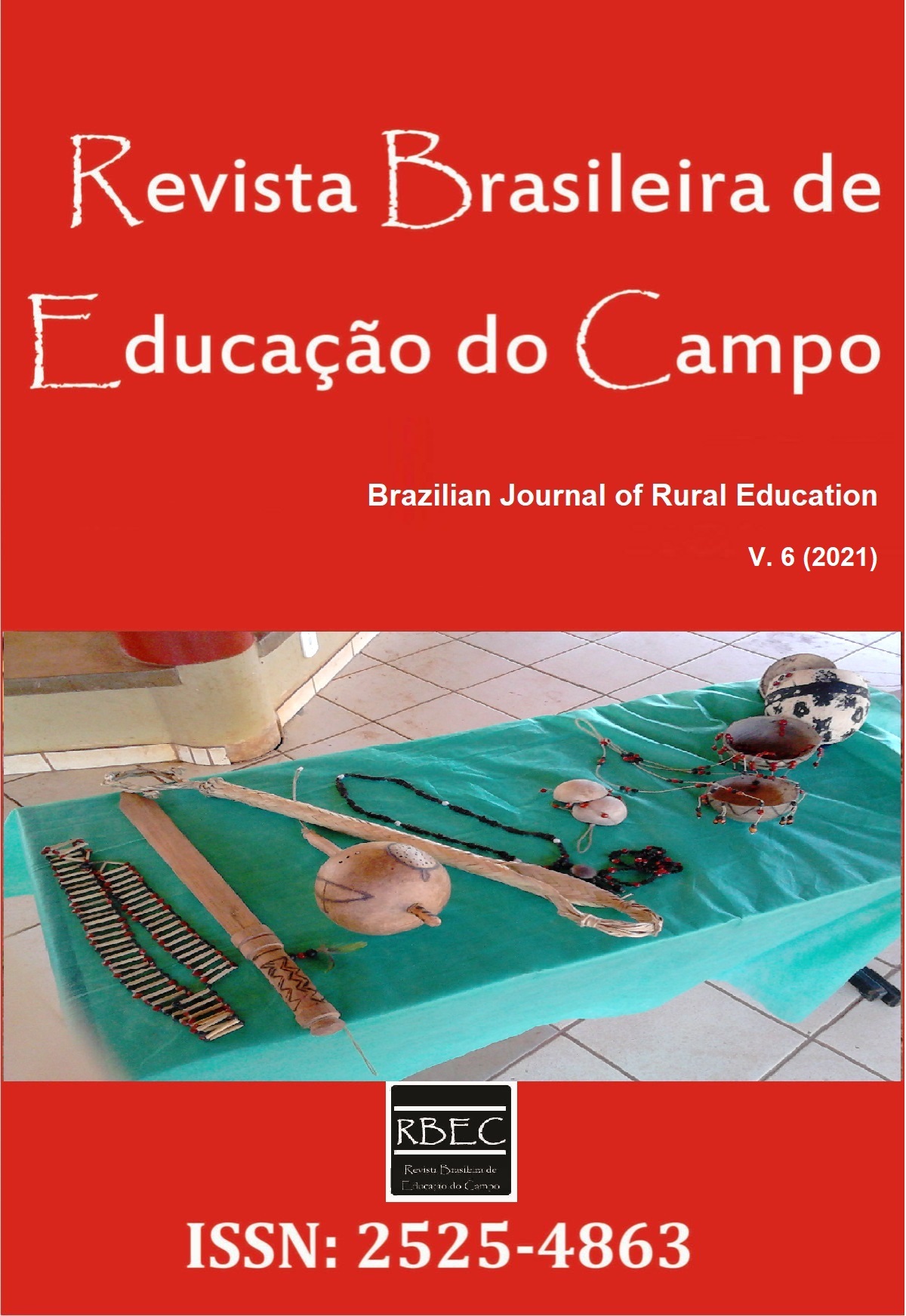The Antônio Conselheiro Settlement: The Importance of the Collective Map in Reading Peasant Reality
DOI :
https://doi.org/10.20873/uft.rbec.e9695Mots-clés :
Rural settlements. Conflicts in the fiels. Social cartographyRésumé
ABSTRACT. The conquest of rural settlements in the Brazilian countryside has led to the certainty of new daily challenges for the settlers, including the struggle for public policies that boost production, income generation, and good quality education. The article aims to analyze the use of social cartography in the Antônio Conselheiro Settlement, located between Ocara and Aracoiaba in Ceará, Brazil. The methodological procedure is part of a research project carried out between 2016 and 2018 and was developed based on pedagogical workshops conducted with students of the Education Service for Youth and Adult Rural Workers (EJA) at Raimundo Facó School. Additionally, fieldwork, interviews, preliminary sketches, and the collective map were used in the research. This Social cartography was developed at a time when the communities were experiencing conflict with public agencies and looking for ways to demonstrate their work and autonomy in the management of spaces for production, marketing, and leisure. The results show a consolidated rural settlement with the production, consumption, and commercialization of agricultural and artisanal products. The introduction of social cartography to the community through adult elementary education is a differentiated approach to the dialogue between popular and geographic knowledge and is fundamental for interpreting the peasant reality.
Téléchargements
Références
Araújo, M. N. R. (2012). Educação de Jovens e Adultos (EJA). In Caldart, R. S., Pereira, I. B., Alentejano, P., & Frigotto, G. (Orgs.). Dicionário da Educação do Campo (pp. 250-257). Rio de Janeiro, São Paulo: Escola Politécnica de Saúde Joaquim Venâncio, Expressão Popular.
Batista, M. S. (2014). Questão Agrária e Campesinato: a feira agroecológica como uma estratégia de consolidação camponesa (Dissertação de Mestrado). Universidade Federal do Ceará, Ceará.
Batista, S. C. (2014). Construindo uma cartografia camponesa. Para Onde!? Revista do Programa de Pós-Graduação em Geografia, 8(2), 63-73. https://doi.org/10.22456/1982-0003.61569
Carvalho, H. M., & Costa. F. A. (2012). Agricultura camponesa. In Caldart, R. S., Pereira, I. B., Alentejano, P., & Frigotto, G. (Orgs.). Dicionário da Educação do Campo (pp. 26-32). Rio de Janeiro, São Paulo: Escola Politécnica de Saúde Joaquim Venâncio: Expressão Popular.
Escrivão Filho, A. (2012). Despejos. In Caldart, R. S., Pereira, I. B., Alentejano, P., & Frigotto, G. (Orgs.). Dicionário da Educação do Campo (pp. 210-215). Rio de Janeiro, São Paulo: Escola Politécnica de Saúde Joaquim Venâncio: Expressão Popular.
Feliciano, C. A. (2006). Movimento camponês rebelde: a reforma agrária no Brasil. São Paulo: Contexto.
Fernandes, B. M. (1996). Movimento dos Trabalhadores Rurais Sem Terra: formação e territorialização em São Paulo. São Paulo: Hucitec.
Fernandes, B. M. (2012). Acampamento. In Caldart, R. S., Pereira, I. B., Alentejano, P., & Frigotto, G. (Orgs.). Dicionário da Educação do Campo (pp. 21-25). Rio de Janeiro, São Paulo: Escola Politécnica de Saúde Joaquim Venâncio: Expressão Popular.
Fernandes, B. M. (2012). Movimento dos Trabalhadores Rurais Sem Terra (MST). In Caldart, R. S., Pereira, I. B., Alentejano, P., & Frigotto, G. (Orgs.). Dicionário da Educação do Campo (pp. 496-499). Rio de Janeiro, São Paulo: Escola Politécnica de Saúde Joaquim Venâncio: Expressão Popular.
Moura, M. M. (1986). Camponeses. São Paulo: Editora Ática.
Leite, S. P. (2012). Assentamento rural. In Caldart, R. S., Pereira, I. B., Alentejano, P., & Frigotto, G. (Orgs.). Dicionário da Educação do Campo (pp. 108-111). Rio de Janeiro, São Paulo: Escola Politécnica de Saúde Joaquim Venâncio: Expressão Popular.
Oliveira, A. M. (2017). A recriação camponesa em assentamentos rurais. Fortaleza: Impressa Universitária.
Oliveira, A. M., & Sampaio, A. J. M. (2017). Escola camponesa: a horta didática em área de reforma agrária. Revista NERA, 37(20). 154-168. https://doi.org/10.47946/rnera.v0i37.4989
Pernambuco, M. M. (1993). Quando a troca se estabelece. In Pontuschka, N. N. (Org.). Ousadia no diálogo (pp. 19-36). São Paulo, SP: Edições Loyola.
Santos, D. (2016). Cartografia social como perspectiva contemporânea da geografia. InterEspaço Revista de Geografia e Interdisciplinaridade, 2(6), 273-293. http://dx.doi.org/10.18764/2446-6549/interespaco.v2n6p273-293
Sales, C. M. V. (2003). Criações Coletivas da Juventude no Campo Político: um olhar sobre os assentamentos rurais do MST (Tese de Doutorado). Universidade Federal do Ceará, Ceará.
Sousa, A. H. (2018). Assentamento Antônio Conselheiro/CE: um olhar sobre suas relações sócio-espaciais. (Dissertação de Mestrado). Universidade Federal do Ceará, Ceará.
Stédile, J. P., & Fernandes, B. M. (1999). Brava Gente: A trajetória do MST e a luta pela terra no Brasil. São Paulo, SP: Fundação Perseu Abramo.
Téléchargements
Publié-e
Comment citer
Numéro
Rubrique
Licence
Proposal for Copyright Notice Creative Commons
1. Policy Proposal to Open Access Journals
Authors who publish with this journal agree to the following terms:
A. Authors retain copyright and grant the journal right of first publication with the work simultaneously licensed under the Creative Commons Attribution License that allows sharing the work with recognition of its initial publication in this journal.
B. Authors are able to take on additional contracts separately, non-exclusive distribution of the version of the paper published in this journal (ex .: publish in institutional repository or as a book), with an acknowledgment of its initial publication in this journal.
C. Authors are permitted and encouraged to post their work online (eg .: in institutional repositories or on their website) at any point before or during the editorial process, as it can lead to productive exchanges, as well as increase the impact and the citation of published work (See the Effect of Open Access).














